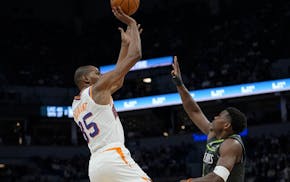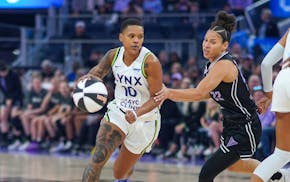The Gophers still hope football attendance reaches 100% capacity at TCF Bank Stadium this fall, but with the COVID-19 pandemic, "the reality of that is probably dwindling by the day as we get closer," associate athletic director Mike Wierzbicki said this week.
Wierzbicki, who heads Gophers external affairs, said the department is planning for various contingencies, including filling the stadium at 75%, 50% and 25% of capacity.
Somewhere between those final two percentages, the school would have to turn away some season-ticket holders for each game. And the department's "Gopher Score" loyalty program could determine that cutoff.
The department bases the ranking on factors such as the number of years a fan has held season tickets and the amount of money donated to the athletics department. The Gophers already use this system to determine access to bowl game ticket sales as well as season-ticket upgrades.
Wierzbicki, though, is cautiously optimistic it won't have to come to that.
"Hopefully, we're in a spot where we can take care of season-ticket holders and then still have the ability to leverage that Gopher Score system for single-game sales," he said.
In 2018, the Gophers sold 21,663 season tickets. That number was similar heading into last year's opener, and the team is on the same trajectory this year, despite the pandemic and economic downturn.
The Gophers have a lot to sell with quarterback Tanner Morgan, receiver Rashod Bateman and several other key players back from 2019's 11-2 season.
If the Gophers again sell about 21,700 season tickets, that would represent 43% of TCF Bank Stadium's official capacity of 50,805.
"With the season we had last year and where the momentum is at, there's tons of positivity," Wierzbicki said. "So we were on pace … to sell our largest number of new season tickets than we ever have with Gopher football. And I think that we'll still hit that. … Last year, we finished renewals right around the 90 percent mark. That's kind of where we're trending at right now."
Wierzbicki said the global pandemic's timing was "hard" on the Gophers' sales, making the athletic department wonder what could have been, coming off the team's top-10 finish and victory over Auburn in the Outback Bowl.
The department had been on track for a $1 million surplus in February after increasing its 2018 football attendance from 37,915 to 46,190 last year, the third-largest jump in Division I.
Instead, with spring sports halted and the future in limbo, the Gophers stand to lose anywhere from $10 million to $75 million if football and other fall sports are canceled.
"Hey, this is the hand we've been dealt. Everybody's dealing with this. We're not going to dwell on the negatives," Wierzbicki said. "We're still going to find the positive and rebuild and move forward."
Other major college programs have grappled with the same problems, including Iowa State, which floated the idea of not selling any single-game tickets in order to accommodate all season-ticket holders.
Nebraska reportedly plans to use a ranking system similar to the Gophers' to determine which of its 70,000 season-ticket holders can attend Cornhuskers games.
Arkansas recently increased the percentage of football seats it can occupy from 33% to 66%, but that still won't be enough for all Razorbacks season-ticket holders.
Rick Thorpe, Arkansas' deputy athletic director, said during a webinar this week that it's important to reward all fans, not just the biggest boosters, with a chance to see a game. The more fans who experience at least one game, the more who might eventually return, he said.
"It's a sensitive line we all have to walk," Thorpe said. "We may want to maximize revenue, but we may have to click back a bit."
All the Gophers can do now is continue to prepare for anything, targeting mid-July as a potential decisionmaking time. That includes trying to stay engaged and connected to their fans — through fun activities such as virtual watch parties of past games — without aggressively pushing ticket sales.
"There's just a tactful balance to it," Wierzbicki said. "… We want to make sure that people know, hey, tickets are available. We have policies that will protect people if a season is canceled."

Souhan: Will the Timberwolves trade for Kevin Durant? Should they?

Lynx improve to 7-0 with strong second half vs. expansion Valkyries

Twins lose in walk-off against Seattle for second straight game
Three-goal outburst in second half helps Minnesota United to rare victory in Seattle


